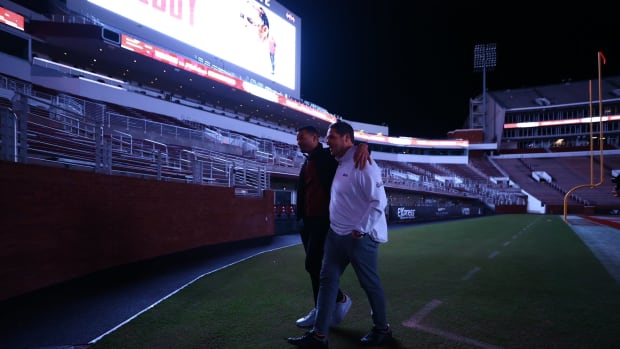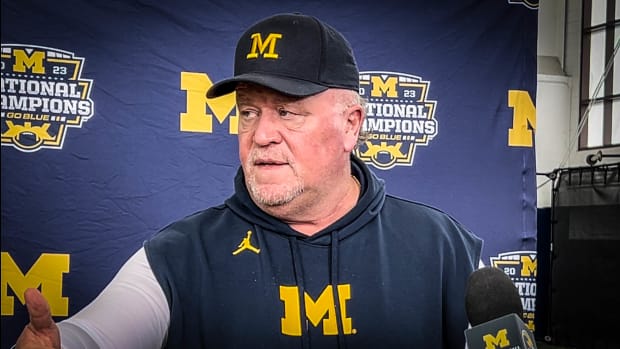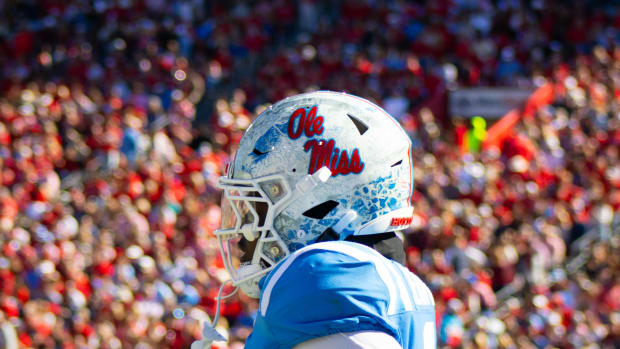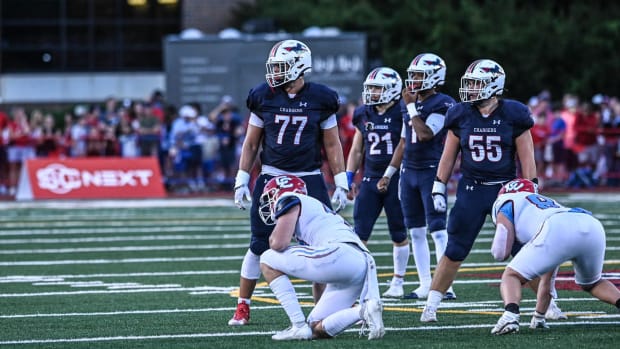The Story of Tom Herman, Ed Orgeron and LSU's Wild 2016 Coaching Search
AUSTIN, Texas — Ed Orgeron’s phone buzzes. He stirs from bed. It is 1:30 in the morning. The text message is from, of all people, his former boss and colleague, Lane Kiffin. It is short and, boy, is it sweet.
You have reached your limit of 4 premium articles
Register your email to get 1 more
Tom Herman leaning to Texas.
You’re probably wondering how in the heck we got here, on Nov. 25, 2016, when the interim coach at LSU is awakened in the middle of the night by the Alabama offensive coordinator with news about the Houston coach on the Texas head coaching job. Well, that takes some explaining. It is part of the 2016 LSU football coaching search novella. This is no different than any other coaching search story. They are all crazy, their clandestine meetings, secret flights and intense negotiations. They shape the future of multi-million dollar programs, attract the attention of snooping reporters and captivate a legion of passionate fans. This particular coaching search pitted two college football bluebloods, LSU and Texas, both desperately craving a return to glory and hunting for the man to get them there. It just so happened that for a small window of time in November 2016 they were both chasing the same man: Tom Herman.
This Saturday night, here in the heart of Texas, under the bright lights of Darrell K Royal Stadium, the results of that coaching search will for the first time ever be captured in a single frame. LSU and Texas will battle on one field as top-10 teams in Week 2 of what each believes is its championship season. How they got here, Orgeron at LSU and Herman at UT, is the product of a wild week, the crescendo of an LSU coaching search that spanned two months, included a half-dozen serious candidates and involved a secret “spy” who flew across the country scouting coaches. Along the way, there was participation from one Steve Spurrier and interest from a guy named Mike Leach. There was a bizarre Thanksgiving night in College Station, Texas, a plane that never left the runway in Baton Rouge, a game that nearly cost one candidate the job and a bidding war that never materialized.
And for the first time ever, the man running the search spoke about it publicly. “Herman was the hot guy, but my thought always was if Herman didn’t work out, I’d go with Ed,” says Joe Alleva, the former LSU athletic director who spoke to Sports Illustrated for this story. “Ed Orgeron was always the guy I really wanted to be the head coach. A lot of people here wanted to pursue the hot name, which was Herman, so we pursued him.
“We were going to fly over there and meet he and his wife,” Alleva continues. “If things went well, he probably would have gotten the job. I got a call from his agent, and he didn’t want to meet. I was done with it. That was it. And I don’t think you can write what I told him.”
Houston is playing UConn on Sept. 29, 2016. On the field is a man in non-partisan apparel scouting the game not for a particular player but for a specific coach: the man captaining the Cougars, Tom Herman. Five days before, LSU had lost at Auburn in a last-second debacle to drop to 2–2, the program fired Les Miles and named its defensive line coach as interim head coach. The school, through intermediaries, quickly contacted representatives of multiple candidates in the days following the decision to fire Miles. At that point, a two-month, 62-day and 1,500-hour long hunt commenced.
Early in the process, Joe Alleva appeared on a local radio show on which a host asked him about a search committee, and he famously replied, “I am the search.” There is some truth to his comment. During this search, Alleva cut out his closest confidantes and at least two high-level athletic administrators, Verge Ausberry and Eddie Nunez, along with mega boosters, all of them kept in the dark. Information was only shared with three members of the LSU Board of Supervisors and school president F. King Alexander, four men who made up a five-man search committee. Almost three years later, a sixth member comes to light: a traveling scout of coaching candidates.
“He was my spy,” Alleva cackles. The guy on the field at the Houston-UConn game was Alleva’s spy. That person remains nameless, but according to Alleva, he was a trusted veteran of college football from the coaching search firm industry. In addition to his spy, Alleva had another helper: Steve Spurrier. The two have a healthy friendship that dates back to their days at Duke in the 1980s. “I’d call him about candidates and get his opinion,” Alleva says.
Alleva’s spy attended four more games that season, scouting then-West Virginia coach Dana Holgorsen and Oklahoma State coach Mike Gundy when the Cowboys hosted the Mountaineers on Oct. 29. Two days before that, the man traveled to Pittsburgh to scout Virginia Tech coach Justin Fuente in the Hokies’ game against the Panthers. As for Herman, the man scouted him three times. Six weeks after watching the Cougars beat UConn, he saw Herman’s squad upset then-No. 3 Louisville on Nov. 17. In his final scouting assignment, the spy saw Houston’s loss at Memphis on Black Friday, a game that ended about 20 hours before LSU would name its next head football coach. It would not be the man the spy was scouting, the one school officials pursued for two months, the guy who danced seriously with them on Thanksgiving week, a slim offensive guru who reminded many of the next Urban Meyer. In fact, it would be virtually the exact opposite: a barrel-chested Cajun man who had never even been a coordinator, his expertise only on defense.
Kelly Orgeron returned from dinner with bad news for her husband. LSU had offered its head coaching job to Jimbo Fisher. “Everybody,” she told Ed Orgeron, “was talking about it at dinner.” This was Wednesday night, a day before LSU played at Texas A&M in what many thought would be Ed Orgeron’s final game as coach of the Tigers. The Orgerons and more than 200 others—players, administrators, coaching staff, parents—spent that night in the team hotel. It was buzzing with talk of Fisher, a sort of long lost son for the Tigers. Fisher has in the past expressed his affection for LSU, where he served as offensive coordinator for seven years and has twice been seriously in the mix to be the Tigers head coach. He interviewed for the job to replace Nick Saban in 2005 and was the clear choice to potentially replace Miles in 2015.
Earlier in the day, just before the team took flight for College Station, Texas, a Baton Rouge radio host, Charles Hanagriff, had reported on air information that he thought at the time was public knowledge. “I had been told from somebody I trusted that if they would prepare an offer to Jimbo, he was willing to come,” says Hanagriff, still a host on that radio station, ESPN 104.5 FM. By the time the team landed in Texas, the rumblings about Fisher had reached a fever pitch, so much so that Orgeron noticed pockets of players and staff members whispering and gesturing to their phones, none brave enough to tell the man in charge the news. Team meetings that night in the hotel were a mess. The swirling rumors were not only that Fisher was coming but that he planned to keep on staff LSU’s current receivers coach, Dameyune Craig, one of Fisher’s former quarterbacks at Auburn and a guy who now works for Fisher at Texas A&M. “There were guys on our staff talking about this and that and where these guys are going,” says Orgeron. “They never said it in front of me, but you can tell it was going on.”
Joe Alleva and others are here to set the record straight about Fisher. In 2016, Alleva had one phone call with Fisher’s agent, Jimmy Sexton, early in the search process. They never spoke again. In the end, he was not a serious candidate, partly because of his price tag: $7.5 million a year over seven years, committee members say. New Orleans businessman Stephen Perry, a board member who served on that search committee, describes a “fateful moment” during the search when decision-makers agreed not to pursue Fisher. “We loved Jimbo and thought he was a great guy, but we felt like the program at Florida State was in a downward spiral. And what the agent was asking for…” Perry says trailing off. Committee members told no one of this decision. In fact, they allowed the Fisher rumors to fester and even sometimes fueled it as a smokescreen to negotiate with their real candidate.
On Wednesday, a day before LSU played Texas A&M, reports from The Shreveport Times and ESPN about an offer to Fisher were wrong, committee members now say. Behind the scenes, school officials were in intense negotiations with Trace Armstrong, the agent of Herman. At some point that week, Alleva and committee members scheduled an interview in Houston for that Saturday morning with the coach. Through deep talks with Armstrong, the school had met Herman’s requests, and a contract was readied. “We had numbers worked out with Tom,” Alleva says. Some sources claim an offer was extended, and that Herman had verbally agreed. Alleva vehemently disputes that. The price for Herman was $5 million a year, Perry says. “We never had a deal, but we were both very seriously dancing,” Alleva says.
All of this would soon change, mostly because of the outcomes of two games in a span of 18 hours. On Thanksgiving night, Orgeron-led LSU, despite mounting distractions, crushed Texas A&M, 54–39, and then the next day, TCU beat Texas and Charlie Strong, 31–9. The latter resulted in Strong’s firing. Texas needed a coach. “I didn’t get much sleep that weekend,” says Mike Perrin, then UT’s athletic director. “Tom was a clear choice for me. You’ve got to remember I lived in Houston for 43 years. Even living in Austin, I took the Houston paper. I knew what he’d done there.”
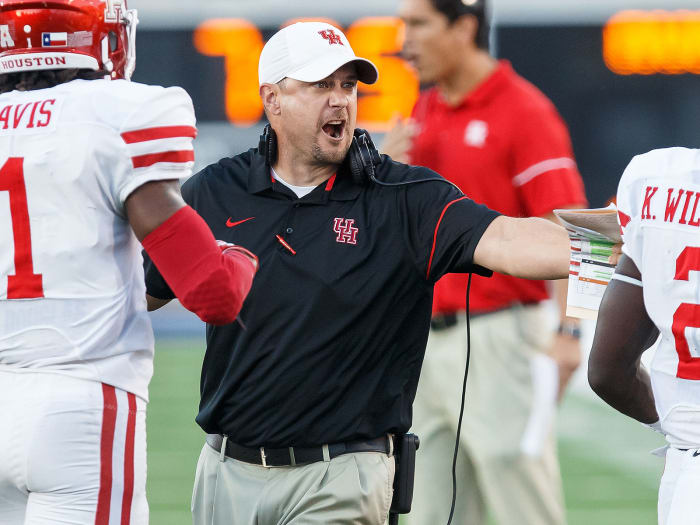
Herman went 22–4 in two seasons at Houston, including a 13–1 mark in 2015.
Matthew Visinsky/Icon Sportswire/Getty Images
Inside his San Antonio home, Robert Dullnig watched LSU go up by two touchdowns on Texas A&M in the first half of their Thanksgiving night bout in College Station. As a lifelong Texas fan and player, that made him happy. However, the ESPN bottom line ticker on the screen made him sad: Tom Herman and LSU close to finalizing a deal. On his couch, Dullnig, a ranch broker and Longhorns booster, sprung into action. “I texted and called other Longhorns fans and boosters who were more influential than me saying, ‘We’ve got to get this guy. We can’t let LSU get him,’” Dullnig recalls.
Herman and Texas have history. Though he’s from Ohio, Herman had spent 12 years of his career coaching college in the state, including two years in Austin as a graduate assistant under Mack Brown. Herman was linked so close with the UT program that many around LSU felt like the school’s pursuit of him was futile. “It was a waste of time,” says one high-placed source at LSU. “He was always going to Texas.” It just took a wake-up call, in the form of that LSU-Herman news. Chip Brown, a Texas beat writer for the last 25 years, originally broke the story at Horns247.com 15 minutes before the Tigers kicked off against the Aggies. How was a story about LSU uncovered by a reporter covering UT? Folks at LSU believe they know. “The agent,” says Joe Alleva, referring to Armstrong, Herman’s representative. “He was working both sides of the deal. I’m not stupid. I knew that was a possibility. That’s what agents are supposed to do, but Herman was playing that same game too.” Armstrong declined to comment when reached. “I felt confident in my reporting,” Brown says in an interview last week. “I think Tom Herman really wanted to see if Texas was going to open. There were a group of big money guys who had let (school president Gregory) Fenves and Perrin know that Tom should be really high on the list.” Fenves declined comment through an assistant. Herman declined comment Monday after his news conference.
For Alleva and committee members, the shroud covering their plan was yanked free. They were angry and concerned. “We began to not trust Tom Herman,” Stephen Perry, the committee member, says. By that time, LSU’s serious pursuit of Herman was four days old, beginning after LSU’s 16–10 loss to Florida at home on the previous Saturday. Hours after that game, during a committee meeting inside LSU’s athletic administration building, the five-man group decided on their top two candidates, Herman and Orgeron. At the start of this search, they sought a sitting head coach who leaned toward offense with a history of molding quarterbacks, the program’s bugaboo. Over two months, Alleva whittled a list of what was at first more than a dozen candidates.
There was Stanford coach David Shaw, who made it known early that he was not interested. There was Texas Tech’s Kliff Kingsbury, but some were concerned how his defense and Air Raid scheme would fit into the SEC. There were at least two candidates in particular who expressed their interest in the position: North Carolina’s Larry Fedora and Washington State’s Mike Leach. Alleva spoke to Colorado’s Mike MacIntyre, as the two worked together at Duke, but things were never too serious. Among them all, Justin Fuente, in his first season at Virginia Tech, was maybe the most alluring candidate for decision-makers, but his buyout was enormous.
Some feel Dana Holgorsen had the inside track on the job early on in the process, but there were off-the-field concerns with the then-Mountaineers coach. Alleva says he was never serious about Oklahoma State coach Mike Gundy, and Utah’s Kyle Whittingham, while intriguing to decision-makers, could have presented a cultural fit problem in south Louisiana. “I often asked myself, ‘Is he better than Coach O?’” Alleva says of these candidates. “My answer was ‘No.’” Alleva wasn’t the only one who felt that way. Stanley Jacobs, a former LSU basketball player who was then on the LSU Board of Supervisors but not on the search committee, agrees with Alleva, a man he’s heavily criticized over the years. “If it came to the full board, I had already made up my mind,” Jacobs says. “If it was not Orgeron, I was going to be vocally opposed.”
So pessimistic about his chances at landing the full-time job at LSU, Ed Orgeron cleared out the temporary on-campus hotel room he occupied while LSU’s interim coach on Black Friday morning, just minutes after completing an interview with Joe Alleva for the full-time gig, his team’s win over the Aggies 12-hours old. While packing up, Orgeron’s phone rang. It was Alleva. “You think Lane Kiffin’s going to really come?” the athletic director asked.
Kiffin, at the time, was the offensive coordinator at Alabama, preparing the Crimson Tide for the SEC championship game. Part of Orgeron’s pitch to Alleva was that Kiffin, his old friend and colleague, would be the Tigers offensive coordinator if he was named the coach. Back on the phone, Orgeron reaffirmed with his boss that Kiffin would come if he didn’t land a head coaching job. “‘Really?” Alleva responded. “Man, you, Lane Kiffin, (defensive coordinator) Dave Aranda… that would be a great combination.” Orgeron’s connection to Kiffin and his impressive interview with Alleva were not the only things that began to sway committee members. The result of the Thanksgiving night game and the postgame player reaction were significant factors. Committee members either read or heard for themselves the booming chants from the postgame locker room. “Keep Coach O! Keep Coach O!” players shouted.
Even before that game, Alleva and committee members were smitten with Orgeron. In fact, two independent sources with knowledge of the ordeal believe that LSU planned to immediately announce Orgeron as its full-time coach if he were to have beaten Florida. Alleva does not confirm that, but says, “I think that would have made it an easier sell to the public. If he had won the Florida game, there would have been less people concerned about him. People concerned about him were concerned because of what he’d done at Ole Miss, but to me, there are a lot of great coaches who didn’t succeed at their first attempt at being a head coach.”
Starting with LSU’s win over A&M and into Black Friday, things began to swing Orgeron’s way. Not only did Tom Herman’s Houston team lose as touchdown favorites to Memphis, but Austin Thomas and Derek Ponamsky, two support staff members who helped build Orgeron’s case for the full-time job, began reaching out to influencers at the school, stumping for their candidate. The Orgeron camp had realized earlier that it was No. 2. “Within one minute of the interview with Joe, I knew we were second,” Orgeron says. “I told Derek and Austin to leave the room. I looked at Joe and said, ‘Joe, you know I’m the right man for the job at LSU. You know in your belly, I’m the right man for the job. I look forward to being the head coach of the LSU Tigers.’ And I walked out.”
Orgeron had built a rapport with Alleva. By this time, the two were tight. “Ed knew he had to stay close to Joe,” says a source within the LSU athletic department. “O is a recruiter. He knows how to get it done.” Through everything that week, one of Orgeron’s most distinct memories is the plane ride back from College Station after the romping win over the Aggies. This was supposed to be a happy flight. Instead, minutes after takeoff, someone approached Orgeron to deliver some bad news: Tom Herman has been offered the LSU job. Orgeron, always one with quick whit, remembers his reply exactly: “Great! Last night it was Jimbo. Tonight it’s Tom. Tomorrow is our day. Here we go!”
Tom Herman arrived to the Houston football facility on Friday night after an unhappy flight from Memphis. Awaiting him were dozens of TV and print reporters gathered out front of the UH facility, staking out the exit and Herman’s car, parked in the front lot. At some point during this period, a staff member moved Herman’s vehicle to the back of the building, where the coach and his family loaded into the car and drove to a meeting with Texas officials, about 12 hours before he was expected to gather with those from LSU. The Longhorns had entered the dance, the exact thing that LSU decision-makers sought to avoid.
Earlier in the process, Alleva had told Herman’s agent, Armstrong, that he would not be involved in a bidding war, especially not with Texas. Little did LSU officials know, but serious talks between UT and Armstrong began almost immediately after Texas’s loss to TCU, around 7 p.m. that Friday night, Perrin says. While LSU officials were preparing for a flight to Houston to potentially offer their job to Herman, the negotiations between UT and the coach stretched into the wee hours of Saturday morning. Amid them, Ed Orgeron rolled over to see that text from Lane Kiffin.
During negotiations on that Friday and Saturday morning, Perrin knew of LSU’s interest in Herman. “I mean, I read Twitter too,” says Perrin, 73, who has returned to Houston working as an attorney. Perrin was impressed with Herman, and the two sides seemed to reach a deal just before or right around 5 a.m., according to all accounts. Armstrong then phoned Alleva. “He was trying to get me into a bidding war,” Alleva recalls. Multiple sources with direct knowledge of the call say Alleva hung up on Armstrong after expressing his displeasure in two words. “Joe told him, ‘F--- you,’” the source says. At least one of the LSU committee members was en route to the airport to fly to Houston’s Hobby Airport, the rendezvous spot, when Armstrong made the call. “Joe was pissed,” says a friend of Alleva’s, “and he had every right to be.”
In the days afterward, Texas fans celebrated. “As I said to all my LSU friends,” says Pat Frost, a longtime Texas supporter based in San Antonio, “‘We got a bigger checkbook.’”
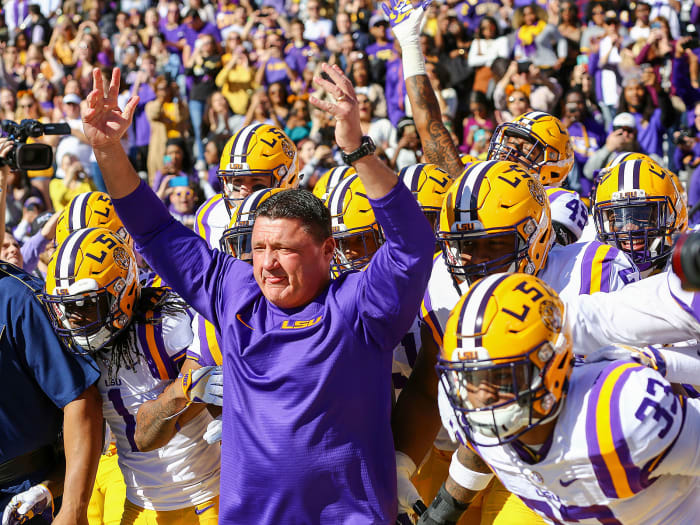
After Orgeron took over as LSU's interim (and later permanent) coach in September 2016, the Tigers closed the season 6–2.
Stephen Lew/Icon Sportswire/Getty Images
Ed Orgeron hung out the window of his black GMC Yukon while driving well over the speed limit on I-12, from his family home in Mandeville to Baton Rouge. That text from Lane Kiffin proved true. About four hours after receiving that message, just after 5 a.m., Joe Alleva called with a message: meet me at the LSU football operations building at 7:30 a.m. “I was rolling, baby, playing Born on the Bayou, windows open,” Orgeron says. “I get there at 7:29. Joe is sitting in front of the Tiger (statue), right there. He says, ‘Well, you want the job or not?’ I took him and bear hugged him and he said, ‘Put me down, you big son of a gun!’”
LSU announced the hiring of Orgeron at 11:59 a.m., then held a noon news conference. Texas announced the hiring of Herman at 4:07 p.m. before introducing the coach at a news conference the next day. Almost three years later, the two programs meet on the gridiron for a game that many UT supporters believe is the most highly anticipated home contest in more than a decade. The Longhorns have been stuck in a Texas-sized rut. They’ve lost at least four games in each of the last nine seasons. The Tigers haven’t endured as rough of a stretch, and while they’ve got the country’s third-longest bowl streak intact, LSU hasn’t played for a conference championship since 2011. Both coaches seem to have their programs on upward trajectories. Orgeron has led LSU to nine and 10 wins. Herman, after a 7–6 first season, marched his squad to the Big 12 championship game last year.
Is Texas back? “This is the most momentum the program has had since 2009,” says Dullnig, the former Texas receiver and rancher, “but every time we get momentum, we shoot ourselves in the foot. Will Herman work out? Probably still too early to tell. There is some caution. Every time we feel good over the last 10 years something has jumped up and slapped us in the face and knocks us back to reality.” Will that thing be LSU? The Tigers return a veteran quarterback, are loaded with athletic freaks on defense and will supposedly unveil what’s been heralded as a new-look, no-huddle spread offense. “We had two different conversations about this whole topic last year, about the decisions we made,” says Stephen Perry, the LSU board member. “We all feel like we all made the best decision. If we could recreate time and have Tom Herman, Jimbo or O, it would be unanimous that we would have taken Coach O all over again. There’s an absolute belief we made the best pick.” Ausberry, LSU’s executive deputy athletic director, declined comment on the search, only telling SI, “It was a process we went through and had a few candidates out there. At the end of the day, we stuck with the right one.”
Both sides feel the same. “I’m confident that we made the right decision,” says Perrin, who will be in attendance Saturday. “I’m pleased that Tom is leading our program.” Joe Alleva will not be in Austin. The school split with its longtime athletic director in the spring. Alleva this week moved to Florida with his wife Annie to be closer to their children and grandchildren. He plans to potentially dabble in some consulting work or maybe teach a class. The Tigers replaced Alleva with LSU alum Scott Woodward, whose hire further intertwines LSU with the state of Texas. Woodward spent the previous three years at Texas A&M and while there, hired Fisher to a 10-year, $75 million contract. He did what LSU officials say they refused to do in 2016. “This worked out well for everybody,” Perry says. “It worked out well for Texas, it worked out well for Texas A&M and it worked out well for LSU.”
Orgeron benefited the most. He knows this. He doesn’t hide from it. If the Texas job had never opened and the Tigers met with their No. 1 man, Herman, not Orgeron, would likely be leading the LSU football team into a hostile environment in Austin on Saturday night. “Everything happened for a reason,” Orgeron says. “You could see it all happen. It was like the perfect storm. I’m sitting there that Friday on the TV watching all those scenarios coming together. You could see all the dominoes fall all over the place.”
Thirty-three months, 1,016 days and 24,380 hours late, LSU and Tom Herman will finally have their meeting.
